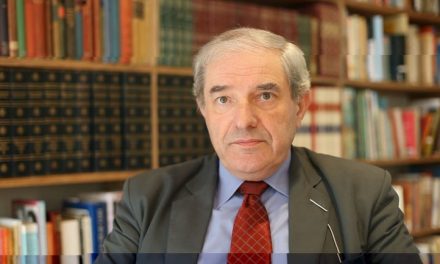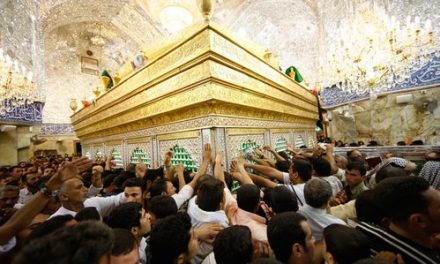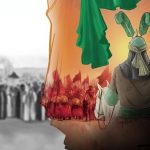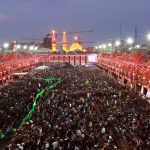
Muslims, on the other hand, have tended to produce polemical works showing how much of what is in the Bible is consistent with the Islamic view of Christ (AS) as prophet rather than as a person of the Trinity. Some interesting work along these lines has been initiated by Ahmad Deedat in South Africa. More profound insights into the differences between Islam and other faiths, including Christianity, may be found in the writings of Frithjof Schuon, Shaykh ‘Isa Nur al-Din Ahmad, who presents the beginnings of a genuine Christology from a sufi perspective in his Islam and the Perennial Philosophy. There is also a valuable collection of stories about Jesus (AS) culled from the writings of various Muslim mystics, Jesus in the Eyes of the Sufis. Some of the items reported in this work have their origins in the narrations attributed to the Shi’i Imams (AS) presented below.
These days there is much discussion of dialogue between different faith communities. Conferences have been held for this purpose in the Islamic Republic of Iran as well as in Africa, Europe and the United States. Perhaps one of the best ways Christians can find common ground for discussion with Muslims is to become familiar with the portrait of Jesus (AS) presented in Islamic sources, the most important of which are the Qur’an and hadith, and as for the latter, no matter what one’s religious orientation, it must be admitted that the narrations handed down through the Household of the Prophet (PBUH) deserve careful attention. For those of us who have the honor of being counted among the Shia, the importance of what has been related by the Ahl al-Bayt weighs especially heavily, as it should, according to the famous hadith al-thaqalayn, in which the Prophet (PBUH), in the last year of his life, is reported to have said: Verily, I am leaving with you two weighty things (thaqalayn): the Book of Allah and my kindred, my household, for indeed, the two of them will never separate until they return to me by the Pond [of Kawthar on the Last Day].
Perhaps some Christians will be dismissive of what is said of Jesus (AS) in the Islamic narrations because the main debate about contemporary Christology among Christians is whether research about the historical Jesus (AS) is relevant to religion, or whether knowledge of Jesus (AS) requires attention to the role he plays in the Church and in theology. The Islamic narrations, coming centuries after the life of Christ (AS) (and in some cases more than a century after the life of Muhammad [PBUH] will likely be dismissed by liberal Christians in pursuit of a portrait of Jesus (AS) based on the standards of historical research currently accepted in the West. The neo-orthodox Christian claims that the Savior is not to be found in history, but in the Church, so it will not be surprising if he displays no interest in what Islam has to say about Christ (AS). However, the Christian may find that the Islamic perspective illuminates a middle ground between the historian’s emphasis on the natural and the ecclesiastical emphasis on the supernatural. The humanity of Jesus (AS) is evident in the narrations of the Shia, but it is a humanity transformed, a perfected humanity, and as such there is no denying its supernatural dimension.
The Muslim always seems to appear as a stranger to the Christian, but perhaps it is from the stranger that the Christian can best come to know his savior. The crucifix has hung in the Church for so long that it becomes difficult for the Christian to find significance there. The attraction of the quest for the historical Jesus is that it provides a fresh look at the subject, even if that quest is married by naturalistic presumptions inimical to the religious outlook. By trying to see Jesus (AS) as the Muslim sees him, the Christian may find his savior come to life, lifted up to God in his own inner life rather than crucified.
If we have given reason for Christians to study the narrations of the Shia about Jesus (AS), the question of the value of such study for Muslims remains. Some might wonder why, when we have the Qur’an and Sunnah, we should be especially interested in Jesus (AS). To begin with, Jesus (AS), along with the prophets Noah, Abraham, Moses, Peace be with them, and Muhammad (PBUH) has a special status in Islam as one of the greatest prophets, the ulu al- ‘azm, the prophets who brought the divine law. What was revealed to the last of them is a confirmation of what was revealed to the others. The truth of the revelation is not to be found in its particularity but in its universality, and we come to understand this best when we understand the teachings of all the prophets (AS). Is this not why so much attention is given to the previous prophets in the Qur’an?
All of the prophets (AS) have brought a gospel of love, love of God and love of neighbor and love even for the meanest of His creatures. So, in the reports narrated below we find Jesus (AS) giving some of his food to the creatures of the sea. At the same time, however, this love is not to be confused with a sentimentalism which would prevent the execution of the divine law. Jesus (AS) found fault with the Pharisees not because of their regard for the exterior forms of religion, but because of their disregard for its interior forms, that is, because of their hypocrisy.
The words of the Spirit of Allah reported in the selections that follow are primarily concerned with morals. These are Christian morals and at the same time Islamic morals. Today Christendom is in a state of moral upheaval. Peculiarly modern ideas of what is right and wrong have found their way into the theologians’ understandings of ethics. Significant areas of agreement are difficult to find. The simple morality taught by Jesus (AS) and which continues to be emphasized in Islam resonates in the narrations of the Shia. While excessive asceticism is forbidden, we are to turn, like Jesus (AS), away from the world to find refuge in God.
From the following narrations we not only become reacquainted with the moral teachings of Jesus (AS) and with his character, but we also discover what the dear friends of Allah, the Household of the Prophet (PBUH) found it important to transmit about him, and thereby we get a glimpse into their moral teachings and characters, too.
Source: al-shia.org










